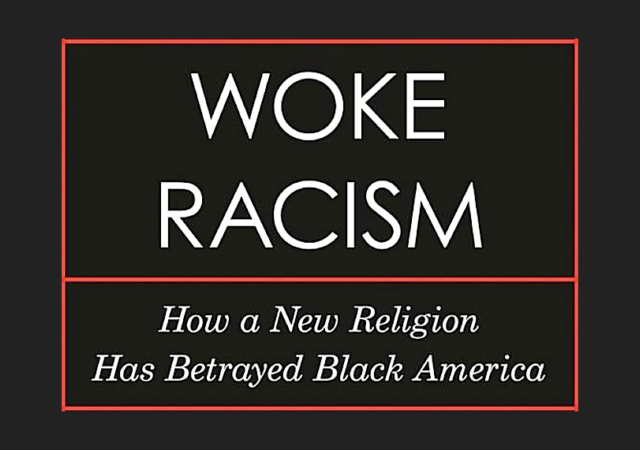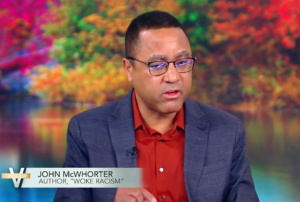Book Review – Woke Racism: How a New Religion Has Betrayed Black America, By John McWhorter

Earlier this month, and unbeknownst to one another, Professor Jacobson and I listened simultaneously to oral argument in the Supreme Court tuition funding case, Carson v. Makin. The petitioners in this case are parents challenging Maine’s school funding program, which prohibits students from using state funds to attend schools that provide religious or “sectarian” instruction. The high court must decide whether Maine’s program violates the Religion Clauses of the Constitution.
During oral argument, the Court’s inquiry touched on a fundamental question: What beliefs, if taught in school, would amount to “religion”? As the state’s lawyer acknowledged, “that is an issue that this Court has struggled with over the years” in cases involving conscientious objectors or IRS tax exemptions, where it has had to determine “is this thing a religion or is it something else?”
As the state’s time was coming to a close, Justice Samuel Alito asked the question that made us both sit up in our seats: What would the state say “about a school that teaches critical race theory?” Would such a school be eligible under Maine’s tuition aid program?
The lawyer for the state balked. That question, he replied, is “something that the legislature would have to look at.” No more was said about critical race theory, which was not at issue in this case to begin with. And, to be clear, the lawyer never implied anything more than that, as with “white supremacy,” which teaches “principles of hatred,” the legislature could determine that teaching critical race theory might be “antithetical” to the public school program.
Still, one might reasonably ask: Which moral principles do amount to religious doctrine and which ones don’t? And why should it be left to some “bureaucrat in Bangor,” as Justice Neil Gorsuch put it, to decide which ethical teachings constitute religion and which ones don’t? Above all, if a school were deemed “sectarian” under the program because it taught critical race theory, then, under the Establishment Clause, public schools should not teach critical race theory either. These questions all lingered in the abstract after oral argument was over.
Although critical race theory has yet to be deemed a “religion” in court, Columbia University’s John McWhorter makes the case that we should treat it as one in his book, Woke Racism: How a New Religion Has Betrayed Black America.
McWhorter is a black (the term he uses) Professor of English and comparative literature who argues that today’s “antiracism” – whose “rootstock” is critical race theory (CRT) – is actually a religion. Its core tenet is that racism is “baked into the structure” of American society. Whites are complicit in racism merely by virtue of their existence in society. They are born with the “original sin” of “white privilege” that they can never wash off. And if they deny it, that just proves they are racists.
McWhorter calls this new religion’s adherents the Elect, an elite group, smug in their belief that they “get the racism thing” and others do not. Their clergy includes the likes of leading spokespersons Robin DiAngelo, and Ibram Kendi. And they have their “Catechism of Contradictions,” a “collection of tenets” such as, “Silence about racism is violence,” and “If you’re white and you date only white people, you’re a racist.”
None of this “dogma” makes any sense. It’s not supposed to. Its purpose is to help you keep finding racism wherever you look in society, whether it’s there or not.
For the Elect, it is not enough merely to click your tongue in disapproval at the people who don’t toe the antiracism line. These heretics must be “excommunicated” or canceled, “not just spoken out against, but called out, isolated, and banned.” This applies to anyone who dares disagree with them — in other words, the “insufficiently antiracist.” Because Americans have been indoctrinated to be terrified of being called racists, McWhorter explains, the Elect are able to intimidate them into compliance with “Salem-style” threats.
And like the residents of Salem accused of witchcraft who confessed in submission to the Puritan Elect, cowed whites confess their white privilege in submission to their modern antiracist counterparts. Such genuflecting was out in full force in 2020 following the killing of George Floyd, when, for example, Democrats in Congress “took the knee” for a now-famous photo op, or when the police chief in the town of Webster, Massachusetts, famously prostrated himself on the pavement in solidarity with Black Lives Matter protesters. These gestures of submission were admissions of white privilege that supposedly validated the antiracism narrative.
Maintaining that narrative, McWhorter explains, is a “hallmark of critical race theory” and it matters more than the reality of any racism. No grammatical sleights of hand are lost on McWhorter, whose Ph.D. is in linguistics. He shows the reader how words can be chosen very carefully to suggest racism of the past “reaches into the present.” As a case in point, he recounts how one historian used the present perfect tense in describing how “the work of Black creative artists has been disregarded” instead of “was” or “had been,” giving the impression that the racism that took place at an earlier time is still alive now. And while it might seem pedantic, McWhorter demonstrates how a consistent use of these subtle turns of phrase can be misleading.
Like so many ideologies that exist to perpetuate themselves, woke racism also relies on empty catchphrases, and here again, McWhorter calls them out. Readers who have been on the receiving end of a woke lecture will appreciate his scare quotes around hollow expressions such as, “we have to talk about” or “we really need to be talking about” or “we must continue having the conversation” about battling racism. Many of these expressions have made their way into the common parlance such as one would hear, say, in an office or corporate setting. Their hollow simulation of action to describe only talk makes it sound as though the speakers are doing something when they are really doing nothing at all. But woke racism requires that there always be racism to talk about.
Other expressions, though, belie the most damning indictment of antiracism: It hurts the black people it claims to help. So when the Elect hold forth about “dismantling structures” while actually harming the people living in those structures, or about “decentering whiteness,” when blacks don’t want or need their “whiteness,” they perpetuate a poisonous narrative: Black peoples’ identity is formed out of what white people think of them: They are nothing but victims. And, just as whites can never erase their original sin of white privilege, blacks can never be anything but victims.
If they don’t understand that their essence is victimhood, McWhorter argues, they will be told they don’t know “who they are,” as seen by whites. Recall, for one memorable example, then presidential candidate Joe Biden’s admonition to undecided black voters: If you don’t vote for me, he scolded, “you ain’t black.” What could be more destructive to the human spirit than to tell the individual he has no agency over his own identity?
That denial of selfhood is the insidious teaching of CRT, the “rootstock” of the new woke religion that, as parents learned this past year, has infiltrated the K-12 school system. CRT teaches children of all races to view the world as divided between the oppressor and the oppressed, based on race. White children are made to feel ashamed of being white, and black children are made to feel victimized. Why should they be taught to identify with either group? Why should they see themselves as pitted against one another? CRT demands it.
And though the harm it inflicts on children as young as five should be reason enough to ban it, McWhorter reminds the reader once again that antiracism is religion: “When we understand that the Elect are a religious body,” he writes, “we understand that their adherents have no business being the final arbiters on our school curricula.” That is because, under the Establishment Clause of the Constitution, public schools may not teach religion. The dogma of antiracism, as McWhorter makes clear, is nothing other than “church” that has no place in “state.”
————————–
Jane Coleman writes on law and policy and lives in New Jersey. Her legal treatise Secondary Trademark Infringement was published by Bloomberg BNA. You can follow Jane on Twitter @JaneBColeman and LinkedIn.
CLICK HERE FOR FULL VERSION OF THIS STORY
